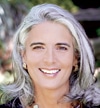by Maria Sirois
Sometimes it is impossible to remember beauty in this world, or kindness. To remember and to find our way through requires courage.
To be brave means to take a risk in the face of obstacles … and in terms of happiness the greatest obstacles live within. To choose a happier life, one of pleasure and meaning and openness to wonder, means to hold clearly the awareness of life’s upheavals and bald nastiness, while seeking the nourishment of what is rich or shimmery, soothing or inspiring, heart-opening and soul-soaring.
To some this may not seem like such an astonishing act but, to many of us, the movement toward happiness means the letting go of family structures and beliefs that served to keep us locked in to pessimism, even despair. So often my students have said to me, “It’s all right that my marriage failed, I never really thought I’d have a happy life anyway.” Or, “Of course my husband would lose his job, everything bad that could happen, happens to me.” Or, “Life sucks and there is nothing I can do about it.” Every time we hear ourselves say this, but still choose a practice that lifts us, we embrace the courage of leaving behind history to seek a new destiny.
“We develop courage by couraging,” wrote Mary Daly. When the voices without seek to keep us small, or our own inner dialogue argues with us to remain disbelieving of life’s bounty, here is what helps to move forward with valor: Dance anyway. Seek laughter regularly. Mindfully ask ourselves, what would make me 3 percent happier in this moment? Who could I call? What could I do? What can I read or listen to or build? What might I say to myself if I chose not to believe that I was doomed to misery and life was hell? If I were a person who loved life … what would I think, right now, in this very moment? And if I were a joyful person, exactly how much zest would I bring to the next conversation, the next meal, my next step outside into this world?
We learn courage by couraging, and we nourish happiness by these brave acts of uplift. And this isn’t about simple getting on, pulling oneself out of bed and up by one’s bootstraps, as our grandfathers used to advise. Sustaining courage involves passion and tenacity. The dogged pursuit of the choice to be vital and vivacious, to bring our whole hearts to life.
The word courage came “from the Latin word cor, meaning heart, and the original definition was to tell the story of who you are with your whole heart,” writes Brené Brown. To do so requires us to bring back with us into the day the lines of shattering … and through these lines begin to perceive, and then act from, the light that burns within.
Courage, we find, is contagious. As we move with bravery toward shaping a day that lifts us, or strengthens us, we find we want to exercise yet more bravery. My choice to practice tunnel climbing and rope climbing, courage in the physical realm, spurred the courage to engage in online dating after a two-year hiatus. And that ridiculously brave act engendered a deeper act of bravery, one in which I reshaped my work life in order to create space, not only for a new love, but for new joy in my life. Courage begets courage and the contagion effect is evident within us and around us. With each move toward a braver life, we model for others the ability to be brave even when scarred, shattered, and on somewhat shaky ground.
There is no perfect time for bravery. The moment is always now.
This post is excerpted from A Short Course in Happiness After Loss (And Other Dark, Difficult Times).
Find out about the Certificate in Wholebeing Positive Psychology, with Maria, Megan McDonough, and others on faculty.
Dr. Maria Sirois, PsyD, is the Vice President of Curriculum at Wholebeing Institute and an inspirational speaker, seminar leader, and author who has worked at the intersections of wellness, psychology, and spirituality for nearly 20 years. As a wellness guide, Maria has been invited to keynote throughout the country at conferences for wellness centers, hospitals, hospices, and philanthropy, business, academic, and corporate institutions, as well as for the general public. She has been called a “true teacher” and “an orator of great power and beauty.” She is the author of “A Short Course in Happiness After Loss (And Other Dark, Difficult Times)” and “Every Day Counts: Lessons in Love, Faith, and Resilience from Children Facing Illness”.










